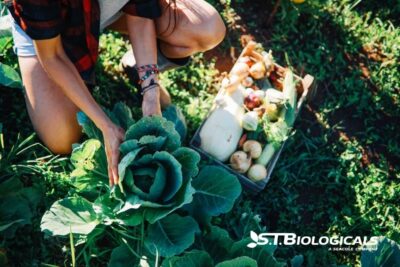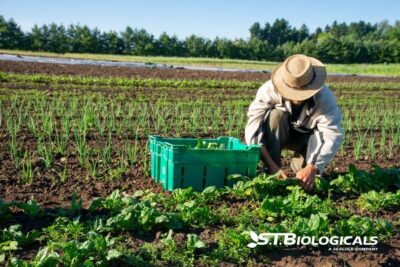Essential nutrients are tied up in post-harvest stubble. These nutrients can be available for next year’s cash crop. But first, the durable lignin and cellulose have to be broken down.
Microbes produce enzymes that break down lignin, cellulose, and other tough fibers. Corn stubble is rich in nitrogen and other macronutrients. Biological products contain the decomposers (microbes) and the humic acid needed as an easily accessible carbon food source.
The surface of stubble is attacked by microbes. The enzymes they produce break down the lignin in the stubble at the macromolecular level. This unlocks the micronutrients and the nitrogen in the corn stubble and makes it available to the roots of the cover crops planted as soil armor.
This process is called bioconversion, soil microorganisms liberate micronutrients and macronutrients. These balanced packs of nutrients increase soil fertility, and foster plant vigor — critical for enhanced growth and higher yield.
The process brings into play the principles of regenerative farming, contributing to a more sustainable agricultural practice.
Biological products not only assist in stubble degradation but also bolster the natural defenses of the plants, making them more resilient to pests and disease. The presence of healthy, diversified soil organisms enhances the soil’s capacity to resist abiotic stress, paving the way for sustainable farming practices. (1)
Some Common Misconceptions About Biological Products
There are misconceptions about biological products that keep conventional farmers and ranchers from using them. But biologicals will help all soils and will fit into all agricultural systems.
Misconception #1 about Biologicals
They can only be used in organic or conservation farming and ranching. In reality, biological products can serve both conventional and organic farming equally well, aiding in stubble degradation and improving soil fertility across the board.
Because biologicals are alive, they are constantly increasing the soil carbon and cycling nutrients. A conventional farmer may find they need less inputs.
Misconception #2 about Biologicals
Have you been told biological products will lead to decreased crop yields? When used correctly, they enhance plant growth and can lead to increased yields. That’s because they play a vital role in soil health, stimulating nutrient release, and promoting stronger, more vigorous crops.
Misconception #3 about Biologicals
Do you think biologicals are only good for certain crops? In truth, they can be applied to a wide variety of crops. From staples like wheat and corn to specialized crops like grape vineyards and tomatoes, biological products have proven the ability to enhance the resilience of any crop to pests, diseases, and abiotic stress.
The Lasting Effect of Biologicals
Soil is not just a medium for plants to anchor their roots; it is also a reservoir of vital nutrients. These nutrients, both micronutrients and macronutrients, are essential for the growth and development of crops.
Micronutrients such as iron, zinc, copper, and manganese, although required in small quantities, play a significant role in plant metabolism and health. Macronutrients like nitrogen, phosphorus, and potassium are needed in larger amounts and are responsible for the overall vigor and productivity of plants.
However, over time, these nutrients get depleted, leading to decreased soil fertility and reduced crop yield.
This is where biological products come into play. They are a natural and sustainable way to replenish the soil with essential nutrients. By introducing biological products in the ag cycle as stubble degraders, your land benefits from the ongoing release of nutrients.
As a result, crops become more resilient to the challenges of farming, such as abiotic stressors like drought or extreme temperatures.
With biological products, farmers can not only improve their crop yields but also contribute to a more sustainable and environmentally friendly approach to agriculture.
To find out how your farm could benefit from biological products, contact our team at ST Biologicals. Soil speaks, we listen.

